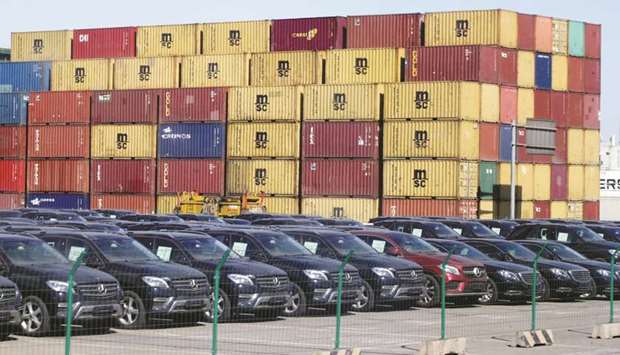China pressed on with its trade war truce with the United States yesterday, announcing it will suspend extra tariffs added to US-made cars and auto parts for three months from January 1.
The move is another sign that the ceasefire has not been derailed by the recent arrest in Canada of a top Chinese telecom executive at the behest of the United States.
Beijing raised tariffs on American-made cars and auto parts this summer by 25% in retaliation for US tariffs on $50bn of Chinese goods.
Halting the punitive duties brings the tariffs back down from 40% to the 15% imposed on all foreign vehicles.
“Suspension of the tariffs is a concrete measure to implement the consensus reached by the two heads of state,” said the announcement by the State Council’s Tariff Commission Office, noting it applied to 211 product codes.
US President Donald Trump and Chinese leader Xi Jinping agreed on the sidelines of the G20 summit in Buenos Aires on December 1 to a 90-day truce while they tried to find a solution to the escalating trade dispute.
Confusion and unease over what agreement the two sides reached in Argentina has roiled stock markets.
But top trade negotiators talked on the phone this week to discuss a timetable for the trade talks and yesterday’s announcement confirms a Trump tweet from December 2 that China would act on the auto tariffs.
“We hope that both sides will, in accordance with the consensus reached by the two heads of state, on the premise of mutual respect, mutual equality, faithfulness, words and actions, and intensify consultations in the direction of cancelling all of the extra tariff increases,” the State Council’s statement said.
The tariff suspension will benefit US carmarkers like Tesla and Ford which have seen their China sales tumble amid the trade tensions.
“It is essential that governments work together to advance balanced and fair trade. We look forward to learning more,” a spokesman for Ford said after Trump announced China would cut car tariffs earlier this month.
International automakers Daimler, maker of the Mercedez-Benz, and BMW have also exported American-made SUVs to China.
US exports to China fell 25% on-year in November as the higher tariffs on hundreds of American goods hurt demand. The arrest of Huawei’s chief financial officer, Meng Wanzhou, in Vancouver on December 1 has also angered China, raising concerns that her case could affect the trade negotiations.
Meng, who faces US fraud charges related to Iran sanctions violations, was released Tuesday on Can$10mn (US$ 7.5mn) bail.
Two Canadians were detained in China on Monday in what many experts say was retaliation for Canada’s arrest of Meng. But the tangible move by China to suspend tariffs on cars and auto parts, as announced by Trump on Twitter shortly after the meeting, is a sign that trade negotiations remain on track.
China on Thursday said that it would welcome US negotiators to visit the country for talks as both sides focus on a solution to thorny trade issues.
Maintaining and resolving the trade truce could help stabilise sentiment in China, where confidence in the economy has been hurt by the trade frictions with key trade partner the US.
Earlier yesterday economic data showed Chinese consumer spending grew at its slowest pace in 15 years and factories eased up in November, raising the prospect that Beijing could turn to fresh stimulus measures to help the sputtering economy.
China’s top officials on the Politburo said in a statement Thursday that major economic indicators will be kept within a reasonable range next year.
“The meeting also signalled further market opening,” economists at Trivium Research wrote in a newsletter.

Imported Mercedes-Benz cars are seen next to containers at Tianjin Port, in northern China. Beijing pressed on with its trade war truce with the US yesterday, announcing it will suspend extra tariffs added to US-made cars and auto parts for three months from January 1.
